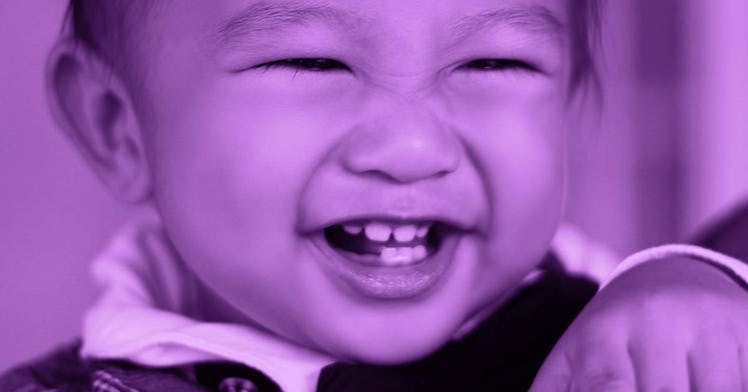What Does It Mean When Your Baby or Toddler Grinds Their Teeth?
While typically not as bad as it sounds, there are some things to watch for.

Adults grind their teeth because of a wide range of emotional states. Anger? Check. Anxiety? Sure. But a baby grinding teeth is a different story. It’s not about anger or fear until they get older. So what does it mean when your baby or toddler grinds their teeth? Here’s what parents should know.
Why is My Baby Grinding Her Teeth?
Teeth grinding, or Bruxism as it is referred to by doctors, is typical in babies, with nearly 50 percent of them doing it at some point. Dr. Kami Hoss, the founder of The Super Dentists, finds most kids grind their teeth as a matter of exploration.
“Simple discovery is one reason kids grind their teeth,” he explains, adding that this curiosity usually begins at about ten months when a baby’s top and bottom front teeth have come in. “They are trying to figure out what’s going on in their mouth as it starts to feel different.”
Dr. Hoss recommends parents check with their dentist, and if the grinding isn’t a result of something more serious, safe teething toys can provide relief. Safe, of course, is the operative word. In 2018, the FDA issued a warning to parents when multiple children died after using beaded teething jewelry.
When is Baby Teeth Grinding a Concern?
Sometimes teeth grinding can be a sign of something more serious, like apnea. In that circumstance, trouble breathing causes the body to activate muscles of the mouth to regain control of the airway to keep it open, which results in the grinding of teeth. Dr. Hoss advises that if your child snores more than usual, breathes through their mouth, or has pauses in their breathing while they sleep, you should let your primary care provider know so they can evaluate your child for sleep apnea.
As kids get older, stress can also cause them to grind their teeth. “Kids get angry, frustrated, sad, or embarrassed. We all take stress out on different body parts,” remarks Dr. Hoss. He encourages parents to pay attention to how their children respond to stress.
What Can Parents Do About Kids Grinding Teeth?
If your child doesn’t pass through the tooth grinding phase independently or if their grinding is persistent, then dental erosion can become a concern. Your child’s dentist will be able to help you know if it gets bad enough to require treatment.
“With little kids, we usually can’t prescribe a mouthguard because it might disrupt baby teeth from falling out or the eruption of permanent teeth,” explains Dr. Hoss. “Tooth grinding isn’t anything to worry too much about, but it is one of the many reasons it’s good to establish dental care for your baby even before their first teeth come in.”
Like almost all pediatric dental issues, your dentist can address tooth grinding more effectively when they have the opportunity to identify the problem early and already have an understanding of what is going on in your child’s mouth.
This article was originally published on